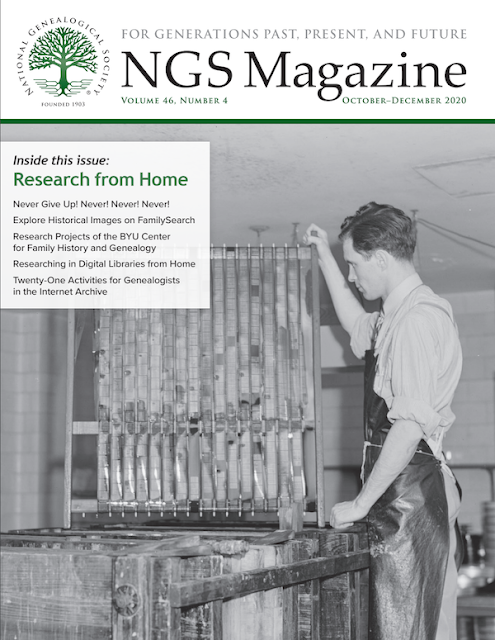EDITOR'S NOTE by Deb Cyprych
Six months after the COVID-19 pandemic led to lockdowns around the world, many libraries and archives have limited access. The National Archives, the Library of Congress, and the Family History Library are still closed as this issue goes to press. Libraries and archives that have reopened will likely have restrictions for some time. In these circumstances, research from home has become a primary method for genealogists tapping into digitized books, scanned records, and databases online.
Claire Mire Bettag tells a story of persistence and amazing payoffs. After a twenty-year search for the origins of her ancestor, she found a tip referring to a digitized administrative report that eventually led her to information about three generations in notarial records. While serendipitous, her story is not unique. Genealogists who continue to search broadly may find such treasures online, too—perhaps even a virtual tour of an ancestor’s neighborhood, as Claire found.
FamilySearch continues to increase access to digitized records. Its new system, Explore Historical Images, publishes images faster than ever before, so quickly that many are not yet indexed by name or listed in the catalog. Robert Raymond explains how to locate and view them in Explore Historical Images by searching for place, date, and life event. He also discloses the next innovation for FamilySearch: Computer Assisted Indexing of historical records.
All researchers can view the results of research projects published by students at Brigham Young University’s Center for Family History and Genealogy. Jill Crandell describes the topics: European emigrant records, script tutorials for eight languages, pre-1841 British census records, Chester and Lancashire marriages, Discovering English Ancestors, Kinship and Poverty in Early Modern Britain, the Nauvoo Community Project, and Welsh Mormon History.
Kathy Petlewski uses two search terms to explore and compare four free digital libraries of interest to historians and genealogists: Google Books, HathiTrust, Digital Public Library of America, and FamilySearch Digital Library. Carla Cegielski discusses the scope of the Internet Archive, a digital library where reading is just one of the twenty-one useful and even entertaining activities for genealogists.
In this issue’s other articles, David Lambert provides an overview of the most recent scholarship for the Mayflower passengers’ descendants and the prime sources for researching Plymouth Colony families; Paul Woodbury demonstrates how to establish a strong foundation for future genetic genealogy research success by creating a detailed profile, preparing lists of ancestral surnames, and uploading a family tree; and Debbie Smyth shows how learning skills in transcribing, abstracting, and extracting can enable genealogists to overcome obstacles and achieve more accurate research and analysis results.


